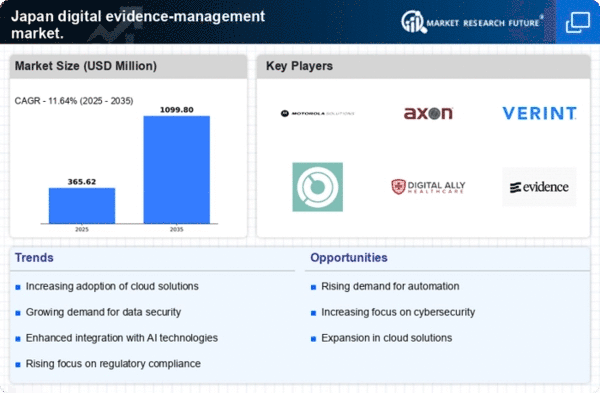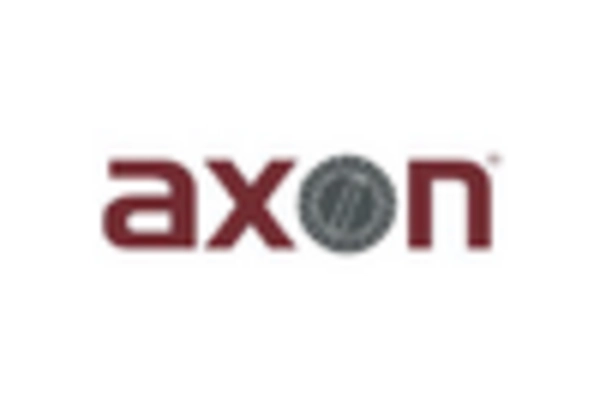Integration of IoT Devices
The proliferation of Internet of Things (IoT) devices in Japan is reshaping the landscape of the digital evidence-management market. As more devices become interconnected, the volume of digital evidence generated is increasing exponentially. This trend necessitates the development of sophisticated management systems capable of handling diverse data types from various sources. The digital evidence-management market will see a significant uptick in demand for solutions that can integrate and analyze data from IoT devices. Analysts predict that the market will grow by 10% over the next few years, driven by the need for effective management of the vast amounts of evidence generated by these devices.
Rising Cybersecurity Threats
The escalating frequency and sophistication of cyber threats in Japan are compelling organizations to invest in robust digital evidence-management solutions. As cybercrime continues to rise, the need for effective evidence collection and management becomes paramount. The digital evidence-management market will benefit from this trend, as organizations seek to safeguard their digital assets and ensure compliance with legal requirements. Reports indicate that cybercrime costs Japan approximately $1.5 billion annually, highlighting the urgency for enhanced digital evidence management. This growing concern over cybersecurity is a significant driver for the digital evidence-management market, as it necessitates the implementation of advanced solutions.
Increased Focus on Data Privacy
In Japan, the growing emphasis on data privacy and protection is influencing the digital evidence-management market. With the introduction of stringent data protection regulations, organizations are compelled to adopt comprehensive evidence-management systems that ensure compliance while safeguarding sensitive information. The digital evidence-management market is expected to expand as businesses invest in solutions that manage evidence while adhering to privacy laws. The market is projected to grow by 12% annually as organizations prioritize data privacy in their operations. This focus on compliance and protection of personal data is a crucial driver for the digital evidence-management market.
Technological Advancements in Forensics
The digital evidence-management market in Japan is experiencing a surge due to rapid technological advancements in forensic tools and methodologies. Innovations such as enhanced data recovery techniques and sophisticated digital analysis software are becoming increasingly prevalent. These advancements enable law enforcement agencies to efficiently manage and analyze digital evidence, thereby improving case resolution rates. According to recent data, the market for forensic technology in Japan is projected to grow at a CAGR of 8.5% over the next five years. This growth is indicative of the increasing reliance on digital evidence in criminal investigations, which is a critical driver for the digital evidence-management market.
Growing Demand for Training and Education
The digital evidence-management market in Japan is also being driven by an increasing demand for training and education in digital forensics. As the complexity of digital evidence grows, law enforcement and legal professionals require specialized training to effectively manage and analyze this evidence. Educational institutions and training programs are emerging to meet this demand, thereby enhancing the skill set of professionals in the field. This focus on education is likely to contribute to the growth of the digital evidence-management market, as a well-trained workforce is essential for the effective implementation of evidence-management solutions. The market is expected to expand by 9% annually as training initiatives gain traction.
















